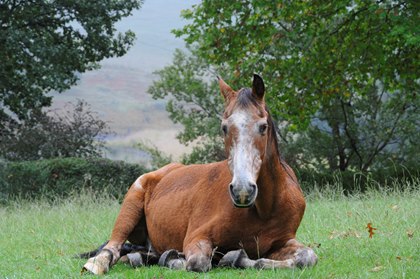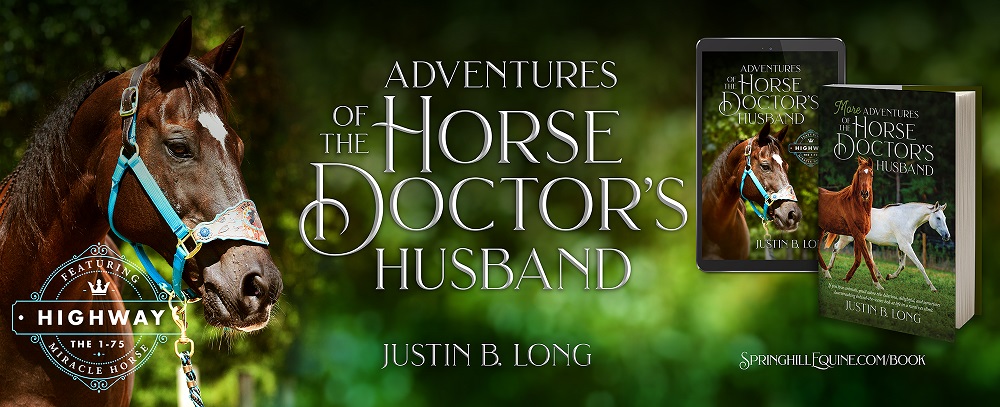Tuesdays with Tony
Sometimes it feels like time is standing still. Other times it feels like I close my eyes for a split second and we are already into the next month of 2021. On days when time flies, I am reminded that every day, I grow another day older. While I still feel great most days and I am certainly young at heart, there are days I can feel my age. I imagine it is much the same for aging horses.
Many of you own senior horses. Most of you have owned your older guys since they were youngsters. You’ve been taking care of their every need day in and day out throughout their whole lives. You’ve raised them from frisky 2 year-olds through their naughty teenage years and now some of them are well into their older years. At each life stage horses require different nutrition, different hoof care, and different veterinary care. You’ve been through the early years and middle age, so let’s talk about what your horse needs now in their golden years.
Lucky for you all, I have established the best team of veterinarians, technicians and office staff to provide you with a wealth of knowledge about caring for you senior horse. I always place emphasis on preventative veterinary care for your horses, hence my Wellness Plans. Preventative care is the best way to be ahead of any potential problems or illnesses that might arise.
Dental Care
One of the most important aspects of veterinary care in the old horse is the dental examination. As horses age, they develop dental changes. These changes include tooth loss, gingival loss, infection, and fracture. Senior horses are prone to a common and painful condition known as Equine Ondontoclastic Tooth Resorption and Hypercementosis, aka EOTRH (or as I like to refer to it as, “the letters”). EOTRH is a type of autoimmune disease in which the horse’s body recognizes their own teeth as foreign material. When this occurs, your horse’s tooth roots are attacked and reabsorbed by their body. Your horse will also lay down bone-like material around their teeth to help stabilize them. The entire process is incredibly painful and unfortunately, there isn’t much that can be done to prevent the process from happening. The only treatment for EOTRH is to remove the horse’s teeth. Tooth removal just sounds so painful, why would humans even consider this? But from what I understand, removal is significantly less painful than leaving the teeth in.
Any dental issues can result in health problems like weight loss, sinus infections, and oral ulceration. Having my docs assess your horse for any oral or dental issues at least once a year is imperative to their overall health. Similarly, if my docs notice any problem areas, they may recommend additional visits throughout the year to address these issues and prevent further problems from developing.
Vaccinations and Coggins
You’ve kept you horse’s vaccinations, Coggins, and deworming up-to-date throughout his whole life. For the love of cats, please don’t stop now! Older horse’s immune systems are more delicate, making them more prone to disease. My docs recommend twice yearly vaccinations against mosquito-born diseases such as EEE and WN and annual vaccination against rabies.
Your horse is an old pasture potato now, but please keep his Coggins up-to-date. For one, if anyone from the state stops by to check on your farm, they will require to see a negative Coggins for all horses on the farm. If you don’t have them you risk being fined and/or quarantined. Not to mention, if any unforeseen circumstances occur where you may have to move your horse (hurricane, flood, illness, injury), you’ll need to have a negative Coggins on hand before you put your horse in a trailer. So save yourself a lot of hassle and keep your horse up-to-date!
Blood Work
As horses age, my docs suggest yearly blood work. It is always a good idea to have a baseline of a normal complete blood cell count and serum biochemistry. If your horse develops an illness there will often be changes to blood work. Having a baseline normal to compare to is incredibly helpful to my docs. Blood work will also allow my docs to recognize any minor changes that may be suggestive of underlying illness. Similarly, a yearly ACTH for an older horse is always a good idea. ACTH tests for Pituitary Pars Intermedia Dysfunction (PPID) or Cushings. PPID can predispose your horse to laminitis. It lowers your horse’s immune response to disease and puts them at risk for illness. Annual testing allows my docs to diagnose PPID early on and get your horse on medication to help manage the disease.
Hoof Care
I know you’ve heard me say it before, but I’m going to say it again: No hoof, no horse. I don’t care how young or old your horse is, he has to have 4 solid feet under him. As we discussed, older horses may be prone to laminitis. This is why I recommend annual radiographs of your horse’s front feet. Radiographs are one of the best tools we have that allow the docs to rule out any changes to your horse’s feet that could cause them pain or lameness. Not only can radiographs show changes to your horse’s feet, they allow my docs to collaborate with your farrier to make adjustments as necessary to prevent any problems down the line. And as you know, an ounce of prevention is worth a pound of cure.
Nutrition
As we all age, our nutrition needs also change. My nutritional requirements have most certainly changed over the years. I would love to eat sweets and carbs all day but with my diabetes I have to be very mindful of what I eat every day. As your horse ages, he also will have changes in nutritional requirements. Inevitably, an older horse will have dental problems. Dental issues can make it difficult for your horse to chew his feed properly. This makes it difficult for him to digest his feed thoroughly. When he doesn’t digest appropriately, he is not getting everything he needs from his food.
It can become nearly impossible for older horses to eat hay and grass. Because of this, it’s necessary to ensure older horse receive everything they need from their grain. Complete feeds such as senior feeds are ideal for the older horse. A complete feed incorporates forage into it so an older horse who can’t eat hay or grass will still meet their daily forage requirements. Similarly, forages such as soaked alfalfa pellets, alfalfa cubes or beat pulp can be added to the older horse’s diet to increase water and caloric intake.
Older horses, like older cats and older people, require a bit more attention and care. Veterinary care for your older horse is essential and may increase your horse’s life expectancy. We love pasture potatoes around here, and love to watch them grow well into their senior years while living their best life. A little TLC will take them a long way.
Until next week,
~Tony
P.S. – As you know, my minions work tirelessly on their podcasts, so take a few minutes and check them out here. They have a wonderful talk on senior horses. Also, we have a Facebook Live event coming up on Thursday Feb. 25th at 6:00 PM on fecals & deworming. Be sure to join us!
Tuesdays with Tony is the official blog of Tony the Clinic Cat at Springhill Equine Veterinary Clinic in Newberry, Florida. If you liked this blog, please subscribe below, and share it with your friends on social media! For more information, please call us at (352) 472-1620, visit our website at SpringhillEquine.com, or follow us on Facebook!
[jetpack_subscription_form title="Subscribe to Whinny's Wisdoms"]


